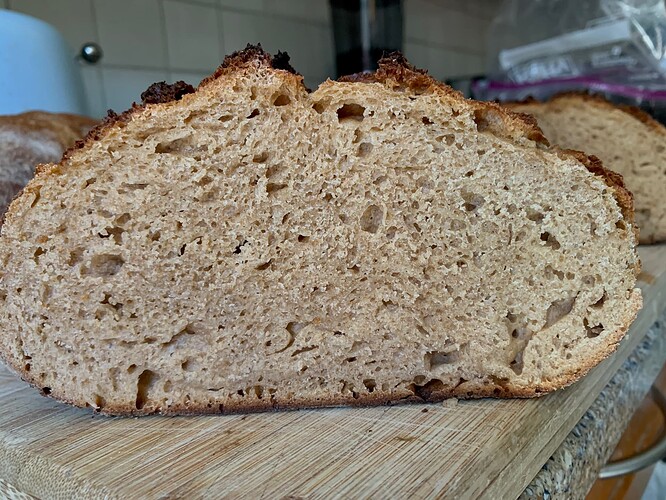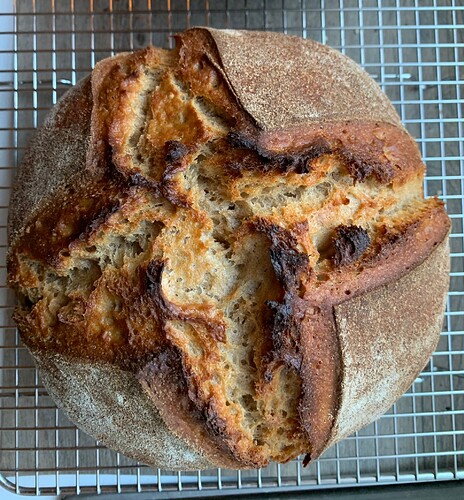I have emmer at the moment too. I look forward to your updates and will do the same 
Well I followed the recipe, but with some changes. I pulled out every trick in the book to make sure the bread rose! That included:
-
Used apple kombucha in place of all the water (I used only a tablespoon of honey because the kombucha was quite sweet.)
-
Added 1tsp diastatic malt
-
Added a pinch (less than 1/8 tsp) acerola cherry powder - does the same thing as ascorbic acid or camu camu
Notes:
The dough was really wet and I had my doubts. But it worked! I did bake it in a pan with sides vs in my Challenger - I think it would have spread more in that.
The additions above sped up the fermentation by light years. Instead of fermenting for 6-12 hours after the stretch & folds it was super ready after 2 hours! Then I did 8 hours in the fridge.
It looks a little dense/gummy in the center. Over-hydrated? I baked it to 210 degrees so it’s not under-baked. Update: once I tasted it, it didn’t seem gummy or dense. The flavor is so incredibly unusual. I don’t know if it’s the flour or the kombucha or the combination!
Look at that tall loaf with an airy-for-emmer crumb. Successful experiment! Wow on the fermentation timing.
My recollection of emmer flavor is that it’s slightly sweet and nutty. But it’s been a long time since I’ve used straight up emmer. Less but still long time since using Ethiopian emmer.
Kombucha is very acidic at 3.5pH. I’m thinking swapping all the water for kombucha will have a negative affect on the gluten from the start! Sourdough starter does turn the dough acidic over time through fermentation but by the time it reaches close to 3.5pH it should be ready to bake. However if you swap all the water for kombucha it will be very acidic from when you mix the dough and the already poor gluten from the Emmer will begin to degrade.
P.s. Here’s another Emmer recipe from Bakerybits.
I hear you Abe, but does it look like the gluten suffered? I thought it looked good for Emmer! I actually got the idea from a UK bakery called Lovingly Artisan - it’s their signature bread.
Not sure Cathy. Emmer, at best of times, doesn’t have good gluten that is why I think it should be treated in a way to bring out its best qualities rather than trying to make it behave like a bread flour. Enjoying it for what it is. Having said that I think your loaf looks very good indeed! If it’s tasty and you’re enjoying it then that is what makes it a success. Logically, adding kombucha (being practically a vinegar), would have a detrimental affect on the gluten. As for Lovingly Artisan I couldn’t comment as I don’t know the full ingredient list nor method. Do they add anything else like baking soda, is it a quick bread, how much kombucha, which brand kombucha etc.
I purchased a couple of pounds of Janie’s Mill 100% Black Emmer last week and looked for a recipe with 100% Emmer – found this one! Thanks!
This is the third time I’ve made a sourdough loaf with:
100% “ancient artisan milled flour”
My own starter that’s about two months old now
I followed this recipe to the letter and found that the dough was extremely sticky and wet. I had to add another 100 grams of flour throughout the fermentation / fold steps to get the dough dry enough to bake.
Once ready to eat, the crumb was VERY dense but delicious! I’ll keep playing with this recipe but am wondering why mine turned out so very sticky at the start?
It is always better to hold back some water, and add it in later if the dough needs it, rather than adding in extra flour.
Emmer is not the easiest flour to work with especially when it’s 100% emmer to-boot. I did a 40% emmer loaf last week and it turned out lovely.
Recipe available if you’re interested.
Black emmer might be a little less absorbent than standard emmer, or have less gluten strength – I haven’t worked with it so I don’t know. But absorbency and gluten development potential are two aspects of a flour that impact how sticky it feels at mixing time. (Over fermenting is what I would diagnose if your dough started out strong and then became goopy and sticky at shaping time.)

